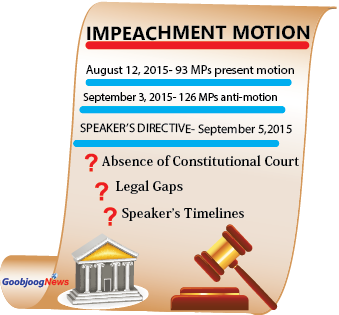Speaker calls for consultation as impeachment motion runs into political circus

The Speaker of Parliament Mohamed Osman Jowari has issued a directive to the government and parliament to deliberate on the procedures and mechanisms to dispose of the impeachment motion which has now degenerated into a political tirade.
In a five page statement, the Speaker points to lack of a clear direction on how the impeachment should be handled given lack of a precedence, absence of a constitutional court and a lacuna in the law. To address the matter, the Speaker has identified four stages.
The first is the deliberations between the executive and parliament over the issues raised in the impeachment motion and if in agreement present it to the house with terms of reference for a vote.
“The only question that merits clarification with respect to the impeachment motion is the absence of Constitutional Court mandated to provide legal opinion before parliamentary debate. But there are many examples on how to overcome such an institutional deficiency or encumbrance. As per article 109B, only five judges render Judicial Judgment,”
However in the likely scenario the two parties do not reach a consensus, a motion will be tabled before the house to seek the creation of a constitutional court so that it can dispense with the matter as provided for in article 92 of the Provisional Constitution.
Finally, if parliament agrees to the creation of the court, then the speaker will write to the High Court to create a special division with powers and authority of the Constitutional court in accordance with the Judicial System Bill No. 3 of 12th June, 1962. Parliament will also play a role in constituting the bench.
President’s impeachment
Article 92 of the Provisional Constitutional, which is in force now in Somalia grants authority to the House of the People to originate a motion of impeachment and submit it to the constitutional court which in turn studies its merits and if satisfied transmits the same to the House for a vote. Only a third of the House needs to give a nod to the motion for the president to be sent home.
However as it stands now, a constitutional court does not exist. Transitional clauses are silent on impeachment before the setting up of the constitutional court. However analysts read mischief in the Speaker’s directive noting that there are enough provisions in law to facilitate the impeachment process.
Political commentator Mohamed Uluso says the Provisional Constitution as it is caters for any supposed inadequacy.
“The only question that merits clarification with respect to the impeachment motion is the absence of Constitutional Court mandated to provide legal opinion before parliamentary debate. But there are many examples on how to overcome such an institutional deficiency or encumbrance. As per article 109B, only five judges render Judicial Judgment,” observes Uluso.
Uluso says the Supreme Court Judges added with additional four judges could render judgment on the legality of the allegations cited in the Impeachment motion.
Anti-impeachment
A group of 93 lawmakers mid last month submitted a 7 point petition seeking to impeach the president for gross violation of the constitutional among other concerns. A week ago, another group of 126 MPs allied to the president launched a counter offensive presenting what it termed as an anti-impeachment motion.
Questions have also been raised concerning the list of the MPs on both sides with claims that some of them are already deceased. Goobjoog News cannot independently however verify this.
Political analyst Col. Shari Robow has also taken issue with the 126 MPs for what he terms as illogical move. “If they have the numbers, why can’t they wait for the motion to be tabled in the house and unanimously vote against it? poses Robow.
A key proponent of the motion Abdirahman Hosh Jibril told Goobjoog News the Speaker Jowari is the main obstacle to the impeachment process accusing him of complicity in violation of the constitution. “The Speaker is busy planning for his retirement. In fact he is plotting a deal to extend his term by another two years. ” said Jibril.
The parliamentary leadership lacks the political backbone to execute its mandate, adds Jibril.
Graft claims
But MPs on the president’s side see the move to impeach the president as an attempt to cover up corrupt practices by some of the lawmakers who were ministers in the former cabinet headed by Prime Minister Abdiweli Sheikh Ahmed.
“Among the MPs who are driving this impeachment motion are some former ministers who the Attorney General accused of graft and misappropriation of funds. So how can someone who himself is suspected of criminal offences purport to hold accountable another? They should face justice,” Abdifatah Noor Matan, MP told Goobjoog News.
In January the Attorney General presented a report to parliament implicating 19 ministries from the government of Prime Minister Abdiweli Sheikh Ahmed of corruption and misappropriation of funds. Attorney General Dr. Ahmed Dahir has since not spoken about it.
But Robow dismisses the graft allegations as attempts to divert attention from the concrete issues raised in the impeachment motion.
“Whose fault is it? The investigating authority should have proceeded to charge the former ministers for the alleged offences long time ago. Why have they been silent all along only to bring it up now? MPs have the constitutional right to impeach the president and an contrarian view can only be canvassed in parliament,” said Robow.
The fact that the Speaker has not set timelines for the proposed process is likely to cast aspersions the more on the fate of the motion even as allegations of plans to derail it through delay continue to be peddled around.